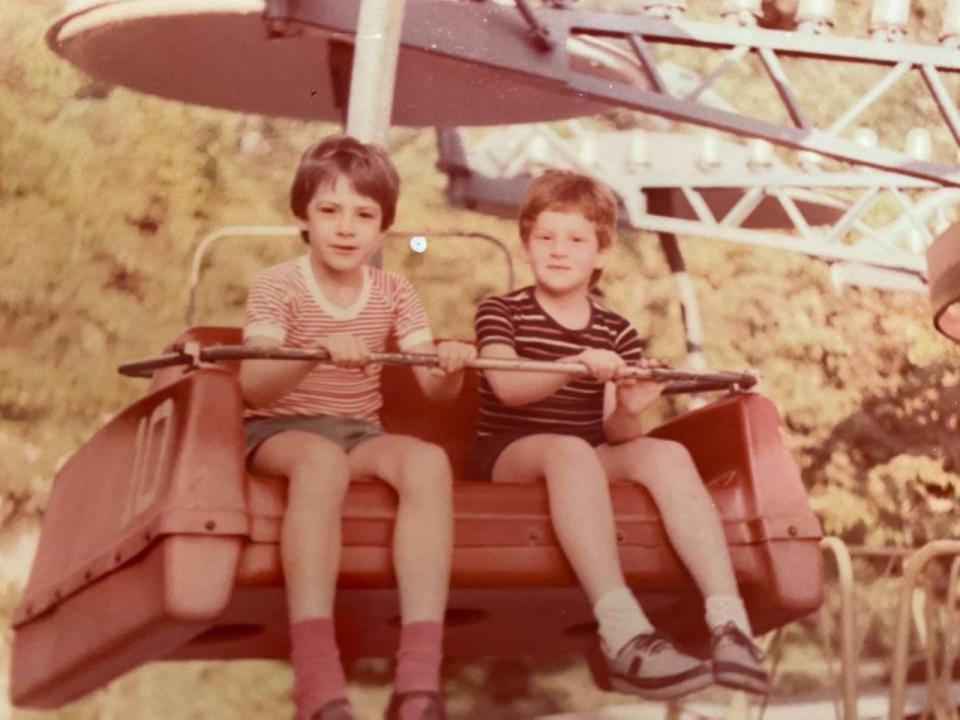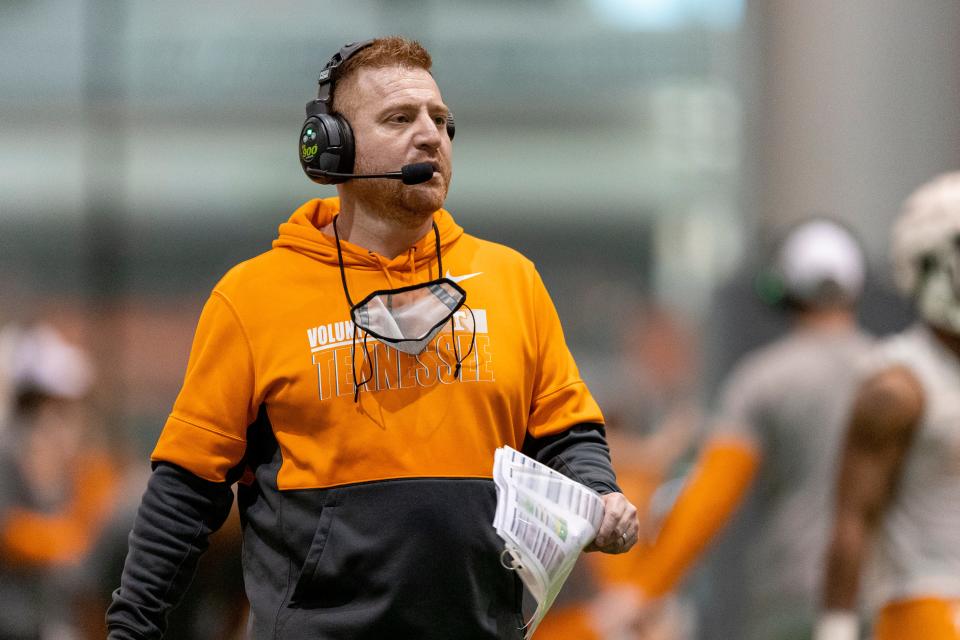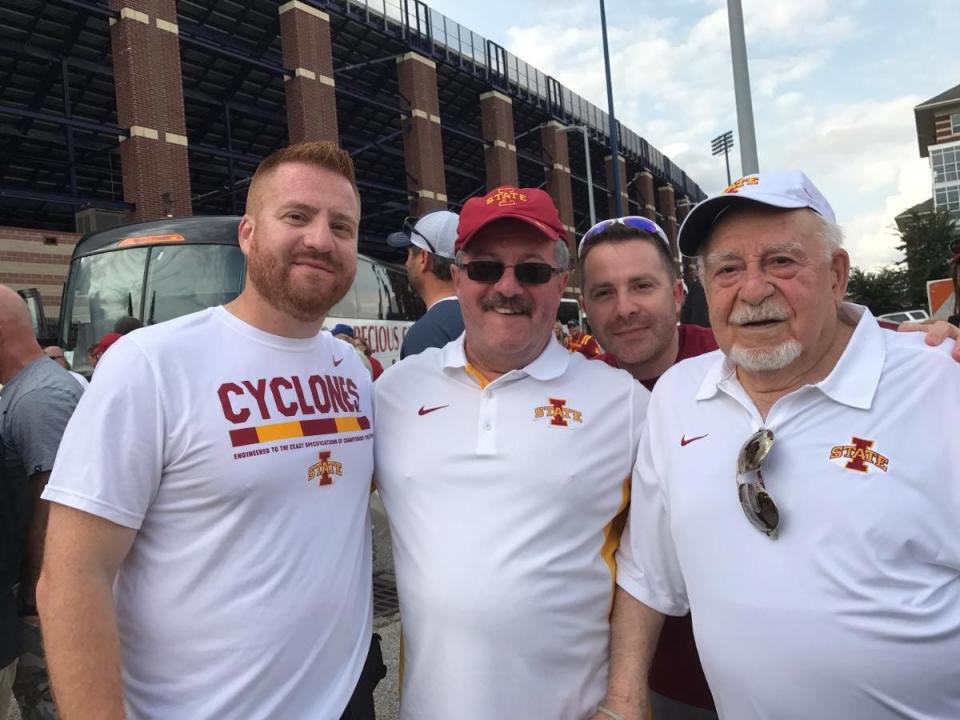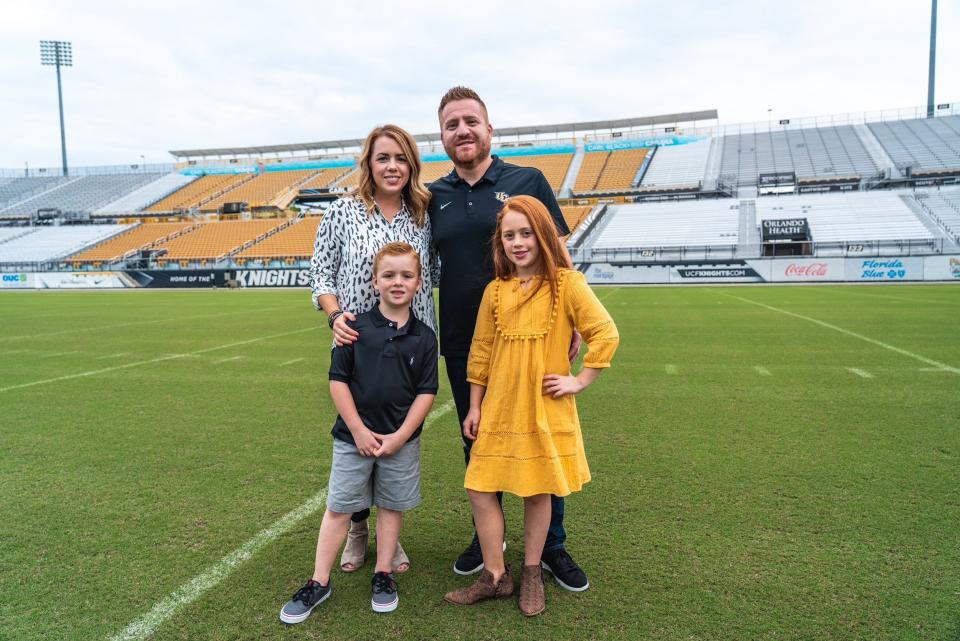How Alex Golesh went from Communist Russia to Tennessee offensive coordinator
- Oops!Something went wrong.Please try again later.
Alex Golesh can’t recall much about his final summer living in Moscow as a child, but he remembers the tanks.
Hardline Communists staged an August coup in 1991 with the goal of ousting Soviet President Mikhail Gorbachev. Tanks were on Moscow’s streets, in the Red Square and in front of Russia’s White House. Three protesters died, one of whom was crushed by a tank. The Soviet Union was on a path to dissolution.
“It was one of those times in ’91 where things were turning. It was bad,” said Eugene Golesh, 39, Alex’s older brother.
Vladimir and Bella Golesh sought better opportunities for their sons, Eugene and Alex.
The family immigrated to New York on Sept. 22, 1991, arriving with $400. They settled in Brooklyn before later moving to Dublin, Ohio, where Alex's parents and brother still live.
Q&A: Tennessee's Alex Golesh talks Russian heritage – and, yes, he's seen 'The Americans'
Alex Golesh was 7 when he arrived in the United States. He didn’t know a word of English.
Today, the 36-year-old Golesh is preparing for his first season as Tennessee’s offensive coordinator, giving him the unusual combination of being a Russian native coaching in America’s most powerful college football conference.

“I saw my dad and my mom work so stinking hard to give us a better life than we would’ve ever had, and if I ever chose not to, I’d be cheating everything they ever did for us," said Golesh, who is the only coordinator in the SEC who was not born in the U.S.
“They’re so beyond proud of me, and I feel like I’m at least on my way to paying them back for everything that they have done for us.”
How Alex Golesh immigrated to Brooklyn from Russia
The family had lived a comfortable, middle-class life in Moscow, Golesh said, thanks in part to his two grandfathers spending their careers in the military.
“My parents sacrificed a lot for us to leave, in terms of, we had a good life,” he said. “At that time, if you were career military, you were living pretty good.”
Golesh's dad also served in the military before working as a telecommunications engineer. The family lived in a Moscow high-rise. During those final years in Russia, Vladimir and Bella did their best to shield their sons from the conflicts boiling within the Soviet Union, Eugene said.

Golesh's aunt served as the family’s required sponsor to immigrate to the United States, after she had come to the U.S. a few years previously. One set of Golesh's grandparents joined him, his brother and his parents in leaving for the U.S. His other grandparents followed a couple years later.
Eugene still remembers the brown jacket he wore the day the family landed in New York. His aunt greeted them with bananas.
“I will never forget that day – hopefully – forever,” Eugene said.

The family moved into a second-floor apartment in Brooklyn before later moving to an apartment above a bodega.
Vladimir and Bella’s college education from Russia wasn't recognized in the U.S. Golesh said his dad got a job driving a delivery truck, while his mom worked odd jobs before earning an associate’s degree and working in a nursing home.
“My brother and I got the easy part of it. For them, it was hard,” Eugene said. “My dad was working his (butt) off.”
When Alex Golesh ‘fell in love with’ football
Golesh's memories of Russia include playing soccer and hockey as a youngster. He recalls Moscow getting its first McDonald’s in 1990.
“I remember standing in line at the grand opening,” he said. “It was a huge McDonald’s, as I remember it.”
His introduction to American football came later, in New York. He first saw the sport played at an upstate summer camp, where a coach from the U.S. Merchant Marine Academy conducted a football clinic. The coach invited Golesh, who had taken English as Second Language classes at school, to be a ball boy at the academy’s games. Golesh's dad took him to a few games in Kings Point, New York, over the next couple of years.

“Ever since then, I was like, ‘I want to play football. I want to be around football,’ " Golesh said. "I fell in love with it.”
The family didn’t have cable television, but Golesh tuned in to network TV to watch college football games featuring teams like Ohio State, Michigan, Notre Dame and Nebraska. He appreciated the sport’s pageantry, strategy and physicality.
New York had a limited youth football scene. Golesh didn’t start playing until after the family moved to Ohio in 1996 in search of a lower cost of living and better job opportunities.
Golesh became a two-way contributor and three-year letterwinner as an undersized lineman at Dublin Scioto High School. Jeff Jones, who was his offensive coordinator and mentor, described him as “a consummate team player.”

“His motor was as good, if not better, than anybody that we had,” Jones said. “He wanted to be on that field, and his effort absolutely mirrored that.”
Coaching as a teenager
A 17-year-old Alex Golesh stood at Jones’ doorstep in 2002, not long after Jones and his wife welcomed the birth of their oldest son, Jordan. Golesh lived around the corner from his offensive coordinator. Other than family members, Golesh was the first person to visit their newborn baby.
“That was an immediate impression on me,” Jones said. “Knowing him now, it makes total sense, just because of the person he’s become, but he genuinely wanted to meet my son, and he was excited for my wife and I as a family, that we’d had our first child.”

Golesh was a 19-year-old Ohio State student when Jones hired his former player to his first assistant coaching job. Jones had become the coach at Westerville Central in Ohio, and he tapped Golesh to coach the defensive line.
“I knew that he was going to work his tail off,” Jones said.
Golesh decided during that season that he wanted to make coaching a profession. After one season at Westerville Central, he worked the next 2½ years as an Ohio State student assistant under Jim Heacock, the Buckeyes’ defensive line coach and later defensive coordinator.

“He really cut his teeth under Jim, because Jim had him doing a lot of things that I don’t think most student coaches are trusted to do,” Jones said. “Jim really took him under his wing.”
From there, Golesh’s story is similar to that of many college football coaches – connections he built helped him climb the ladder. He started his career as a graduate assistant at Northern Illinois under Joe Novak.
After most of Novak’s staff was fired following the 2007 season, Golesh briefly worked as a bartender at a steakhouse in DeKalb, Illinois, before joining Oklahoma State’s staff as a graduate assistant. He then became an assistant at Toledo, Illinois and Iowa State.

Golesh left Iowa State before the 2020 season to become Josh Heupel’s offensive coordinator at Central Florida. And when Heupel was named coach at Tennessee in January, he made the move to Knoxville.
“He’s always done a good job surrounding himself with people that can educate him and teach him so he can learn,” Eugene said. “And he just always loves learning cool, different, new things.”
Background makes Alex Golesh ‘uniquely qualified to understand kids’
Ask Golesh where he’s from, and his go-to answer is, “I’m from all over the place.”
“I’m proud of where I’m from,” he said. “I was born in Moscow. I grew up in Brooklyn. I grew up in Dublin. Three uniquely different places, and all three have shaped me into who I am.”
Jones believes Golesh's wide-ranging background helps him build strong connections. It’s no surprise, then, that along with being an assistant coach at Toledo, Illinois and Iowa State, Golesh doubled as each program’s recruiting coordinator.
“The things that he has been exposed to, I think, make him that much more uniquely qualified to understand kids, to work with families, to understand when a family is in a tough spot or when they’re celebrating something,” Jones said.

Golesh hasn’t returned to Russia since he arrived in the U.S. He’d like to visit with his wife and their two kids, but he doesn’t think the environment is right.
He’s proud of his heritage and still speaks Russian to his grandmother. He also is motivated by his parents’ sacrifice.
“He saw the opportunity he had that many others don’t get, especially from where we came from,” Eugene said. “I think that (what he’s accomplished) was a big thank-you to our parents for getting us here.”
Follow Blake Toppmeyer on Twitter @btoppmeyer.
This article originally appeared on USA TODAY NETWORK: Alex Golesh: From Communist Russia to Tennessee football coordinator
